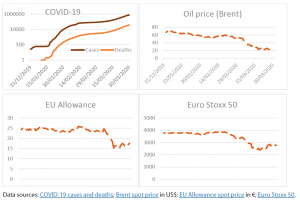At the beginning of April 2020, about a third of the world’s population was subject to measures intended to slow down the spread of the novel coronavirus (SARS-CoV-2) which leads to infection with the COVID-19 disease. These measures range from mild restrictions, such as bans on large events, to very severe ones, such as confinement at home, travel restrictions and closure of schools and non-essential businesses. These measures lead to significant reductions of mobility and economic activity, with a corresponding drop in energy consumption and greenhouse gas (GHG) emissions. The COVID-19 crisis is expected to plunge almost all G20 countries into a recession, according to analysis by the Economist Intelligence Unit. This expectation is confirmed by falling prices in the major stock markets.
The health crisis has brought about far-reaching behavioural changes. Many office workers are now teleworking, in-person meetings and business travel are being replaced by video-conferences, and shopping has increasingly moved online. These developments have reduced individual travel and the associated emissions.








Be the first to write a comment.